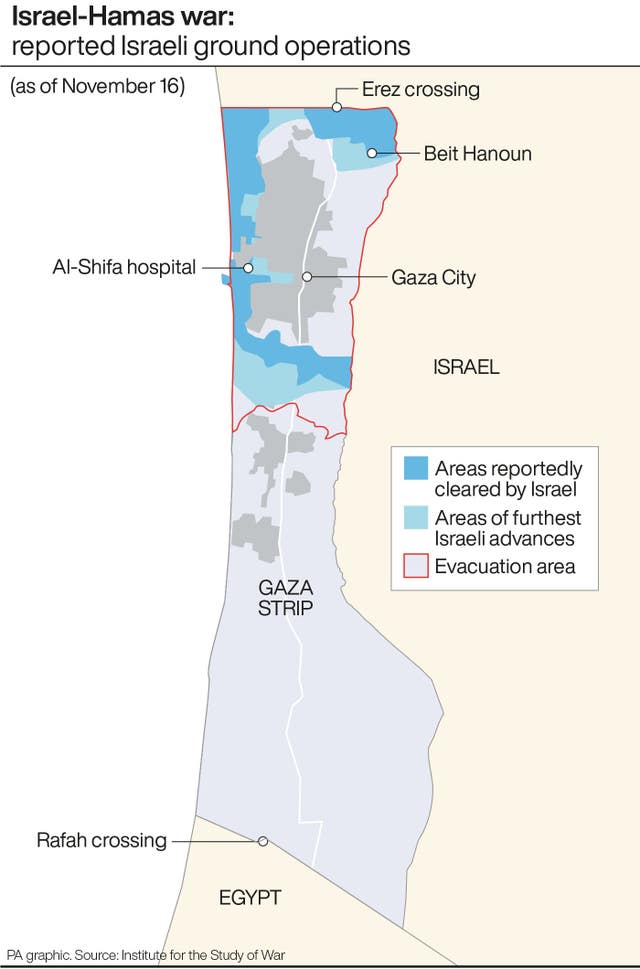Internet and phone service has been partially restored to the Gaza Strip, ending a telecommunications blackout that forced the United Nations to shut down critical humanitarian aid deliveries because it was unable to coordinate its convoys.
But an Israeli airstrike hit a residential building on the outskirts of the town of Khan Younis, killing at least 26 Palestinians, according to a doctor at the hospital where the bodies were taken.
Early in the war, the Israeli military told civilians to flee northern Gaza, the target of its ground offensive, but also kept up its bombardment in the southern evacuation zone where Khan Younis is located.
Israel has signalled plans to expand its offensive south while continuing operations in the north, including Gaza City, where troops were still searching the territory’s biggest hospital, Shifa, for traces of a Hamas command centre that Israel alleges was located under the building — a claim Hamas and the hospital staff deny.
In Khan Younis, the attack early on Saturday hit Hamad City, a middle-class housing development built in recent years with funding from Qatar.

In addition to the 26 people killed, another 20 were wounded, said Dr Nehad Taeima at Nasser Hospital.
Israel rarely comments on individual strikes, saying only that it is targeting Hamas and trying to avoid harm to civilians. In many of the Israeli strikes, women and children have been among the dead.
The war, now in its seventh week, was triggered by Hamas’ October 7 attack in southern Israel, in which militants killed about 1,200 people, mostly civilians, and abducted some 240 men, women and children.
More than 11,400 Palestinians have been killed in the war, two-thirds of them women and minors, according to Palestinian health authorities. Another 2,700 have been reported missing, believed buried under rubble.
The count does not differentiate between civilians and combatants, and Israel says it has killed thousands of militants.
The UN has warned that Gaza’s 2.3 million people are running critically short of food and water, but it was not immediately clear when the agency for Palestinian refugees, known as UNRWA, would be able to resume the delivery of aid that was put on hold on Friday.
UN flags were lowered to half-mast at our offices around the world on Monday to mourn and honour the over 100 @UNRWA colleagues who have been killed in Gaza in recent weeks.
Civilians and humanitarians are #NotATarget.https://t.co/xn2PC1B77Q pic.twitter.com/8DjoMJdAcn
— United Nations (@UN) November 18, 2023
The Palestinian telecommunications provider said it was able to restart its generators after UNRWA donated fuel. The end of the communications blackout meant a return to news and messages from journalists and activists in the besieged enclave on social media platforms as service began to return late on Friday night.
Gaza’s main power plant shut down early in the war and Israel has cut off the electricity supply. That makes fuel necessary to power the generators needed to run not only the telecommunications network, but water treatment plants, sanitation facilities hospitals and other critical infrastructure.
Israel has barred entry of fuel since the start of the war, saying it would be diverted by Hamas for military means. It has also blocked food, water and other supplies except for a trickle of aid from Egypt that aid workers say falls far short of what is needed.
Going forward, Israel said it would allow in 10,000 litres of fuel daily for communications service to continue, according to the US State Department.
Additionally, Israel agreed on Friday after an American request to let a “very minimal” amount of fuel into Gaza each day for humanitarian purposes, Israeli National Security Adviser Tzachi Hanegbi said.
“For as dire as the situation is in Gaza, it could get far worse.”@UNReliefChief at UN General Assembly meeting on the situation in the Middle East. https://t.co/wy8lXFbxGR
— United Nations (@UN) November 17, 2023
Cogat, the Israeli military body responsible for Palestinian affairs, said it would amount to 60,000 litres a day for the UN.
But that is only 37% of the fuel needed by UNRWA to support its humanitarian operations, including food distribution and the operation of generators at hospitals and water and sanitation facilities, the UN said.
Gaza has received only 10% of its required food supplies each day in shipments from Egypt, according to the UN, and the water system shutdown has left most of the population drinking contaminated water, causing an outbreak of disease.
Dehydration and malnutrition are growing, with nearly all residents in need of food, according to the UN’s World Food Programme.




Comments: Our rules
We want our comments to be a lively and valuable part of our community - a place where readers can debate and engage with the most important local issues. The ability to comment on our stories is a privilege, not a right, however, and that privilege may be withdrawn if it is abused or misused.
Please report any comments that break our rules.
Read the rules here